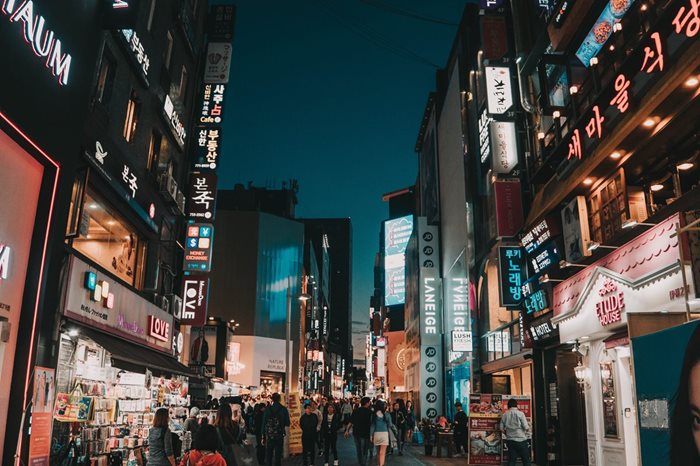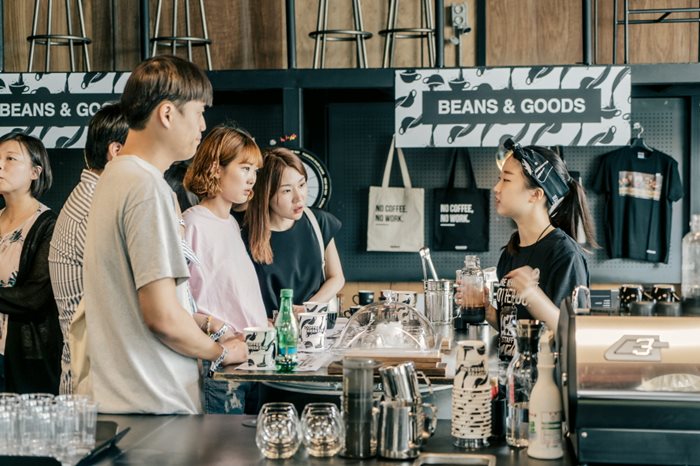Head of Marketing and External Relations at Seoul-based artisan coffee shop chain, BEAN BROTHERS', Seo Young Youn, explains the culture behind South Korea’s coffee boom and why the nation’s cafés just keep getting bigger and bigger. By Tobias Pearce

Seoul is home to an estimated 18,000 coffee shops
Although not traditionally a nation synonymous with café culture, South Korea’s coffee shop market is booming. A recent estimate pegged the East Asian nation’s total coffee market value at 11.7tn won (US$10.8bn), with around 26.5 billion cups of coffee consumed every year.
With the number of cafés estimated to have reached over 88,000, South Korea has one of the highest densities of coffee shops per capita in the world – roughly one café for every
600 citizens.
South Korea is a country of gargantuan coffee shop chains, where domestic market leader Ediya Co., which operates more than 2,000 outlets, jostles with Starbucks’ 1,100+ stores, and thousands of smaller chains and independent brands. The world’s largest coffee chain recently opened its 50th Reserve bar in South Korea, making it the second-largest market for its elevated café concept after China.
With seven stores across the East Asian nation, a further two in the pipeline and two licensed sites in Malaysia, Seoul-based specialty coffee shop, BEAN BROTHERS, is by no means one of the largest chains in South Korea, but has played a key role in championing the country’s specialty coffee movement.
In a country where pre-formulated instant coffee is still hugely popular, BEAN BROTHERS is generating consumer awareness – and appetite – for specialty coffee. With their brand motto; ‘your personal coffee guide’, the specialty chain presents two new single origin beans every month from their Seoul roastery, which produces up to seven tons of coffee a month.
“When we started in 2013 it was difficult to explain the taste of each single origin coffee and we worked hard to make it more attractive and more accessible,” explains Seo Young Youn, Head of Marketing and External Relations at BEAN BROTHERS. Whether revitalising former industrial spaces or introducing South Koreans to the very latest nitro latte brews, each plank of BEAN BROTHERS’ business strategy responds to a facet of Korea’s vibrant café culture.

BEAN BROTHERS operates under the motto "Your personal coffee guide"
Seo Young explains that many South Korean consumers are far more interested in the café they visit than the coffee in their cup. Aside from providing a daily caffeine fix, coffee shops have long been the focal point for an array of work and social activities. Big chains like Starbucks, Café Mena, or Hollys Coffee absorb huge crowds of laptop-laden workers and students while smaller, boutique independents have become hot destinations for that big date or meeting with friends.
“Coffee shop concepts are leading commercial space design nowadays, with co-working spaces, co-living spaces and hotels trying to emulate the café experience. Some successful cafés even work as tenant anchors for larger commercial spots because they can generate high levels of footfall,” says Seo Young.
The seemingly unstoppable demand for coffee in South Korea is providing fertile ground for coffee shops all over the country. Seoulites in particular have developed the cultural tendency to meet out-of-home, something which has been driven by the prevalence of small, standardised apartments in the city, and a strong tradition of third-place gatherings.
“Most apartments or condominiums have low ceilings – people don’t really like staying at home. Over the past decade consumers have preferenced going out and cafés have absorbed much of that demand. In Korean culture you don’t really invite your friends or parties to the home, you meet outside. In the 1980s and 90s a lot of people would go out drinking, but the younger generation are going to bars less.”
Space – the final frontier?
Competition is particularly fierce in Seoul, with a 2017 report in the Korea Economic Daily estimating that while the number of coffee shops in Seoul had exceeded 18,000, just 55.6% of new outlets survive their first year in business. In fact, coffee shop design is so important in South Korea that having a good location is often a secondary concern to devising a beautiful in-store aesthetic, says
Seo Young.
“Because they’re highly competitive, cafés developed these attractive spaces. The amazing thing about Seoul and Korea is that you can really be out in the middle of nowhere and people will still come. Koreans post their café visits on Instagram so fast it is really easy to get buzz if your space is just great,” she explains.
With so many cafés jostling for market share, making a statement is essential to attract custom. This explains the recent trend for bold café concepts in South Korea, with big ex-industrial spaces being snapped up by coffee shops seeking to woo consumers in an increasingly competitive market.
These impressive spaces are not just monuments to South Korea’s beloved beverage, they also demonstrate business confidence in sufficient consumer demand to fill them. Interestingly, many coffee shops are now adapting in-store environments to host a range of events and products revolving around a core coffee offer.
“Coffee shop concepts are leading commercial space design nowadays"
BEAN BROTHERS is currently developing a new café concept in Incheon called ‘COSMO 40’. With its own distinct branding, this gargantuan 3,000sq m warehouse space will function as coffee shop, exhibition space, pizzeria, bakery and bar, in what Seo Young describes as more cultural complex than café. This veritable coffee cathedral makes a bold statement about the role of coffee shops as the ultimate third-place destinations in South Korea.
“It is difficult to just serve coffee into these spaces, so coffee shops are including more content. Many have regular exhibitions, flea markets, community events or live music,” explains Seo Young.
International chains have also responded to this trend, with Starbucks opening its own huge two-tiered 1,000sq m Reserve store in Seoul in January 2018. In June 2019, Nestlé-backed boutique coffee chain, Blue Bottle, opened its first roastery and café in Seoul’s Seongsu district
to huge queues of coffee enthusiasts.
South Korea’s black gold
So, what next for a coffee shop market that is bursting at the seams? Premiumisation is a key trend in developed coffee shop markets across the globe and South Korea is no different. As consumers grow sophisticated tastes and market space for physical store expansion diminishes, coffee shops are turning to new and more premium products to froth sales.
“The pricing structure is moving toward mid and high-end coffee. Forty percent of customers order Americano, but more cafés are trying new concepts like batch brew, which is much more convenient for take-out and much more consistent than manual hand brew,” says Seo Young.
Nitro cold brew is also increasingly popular and saw positive sales in 2017, but it is ready-to-drink (RTD) that Seo Young singles out as the next big opportunity for the South Korean coffee shop market. “In the US you see a lot of specialty brands taking on the RTD market – Blue Bottle, La Colombe or Stumptown. In Korea there are a huge number of specialty brands, but they are not a doing RTD products. If they could refine RTD, they could then could compete with established brands such as Starbucks,”
she explains.
It looks increasingly difficult to keep up with the scale and pace of South Korea’s frenetic coffee shop boom, but the country’s romance with the coffee shop shows no sign of waning. With South Korea currently holding the World Barista Championship courtesy of Jeon Joo Yeon taking the title in 2019, public enthusiasm for specialty coffee and boutique coffee shops will surely continue to grow. For those hospitality businesses that can maintain and grow their share in this bustling market, coffee looks set to remain South Korea’s very own black gold for some time ahead.
 Beanbrothers’ Co-founder and Brand Director, Hoonshik Sung, joins World Coffee Portal
Beanbrothers’ Co-founder and Brand Director, Hoonshik Sung, joins World Coffee Portal
as a speaker at the 4th annual CEO Forum, November 8-9, South Park Center, Los Angeles